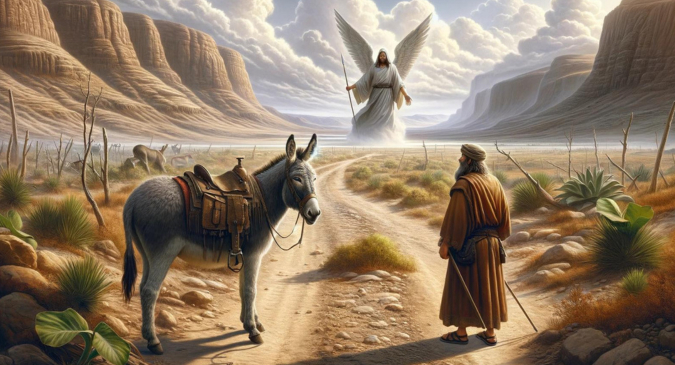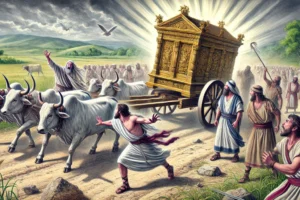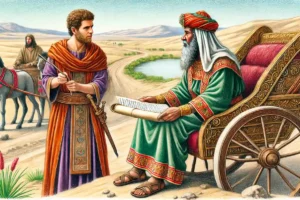
Balaam’s Talking Donkey: Numbers 22
Balaam and his speaking donkey are characters from a narrative found in the Book of Numbers (Chapter 22) in the Hebrew Bible and the Old Testament. Here are some quick facts about this story:
- Balaam: He was a non-Israelite prophet who is asked by Balak, the king of Moab, to curse the Israelites, who were encamped on the plains of Moab. Despite his reputation for being able to bless or curse people successfully, Balaam’s story is notable for highlighting that he could only speak the words that God put in his mouth.
- Speaking Donkey: As Balaam is traveling to meet Balak, his path is blocked three times by an angel of the Lord, which is invisible to Balaam but visible to his donkey. Each time the donkey sees the angel, she turns away from the road, and Balaam, unaware of the angel’s presence, beats her.
- Divine Intervention: On the third instance, the donkey speaks to Balaam, questioning why she is being beaten. This is the first and only instance in the Bible where an animal is recorded speaking in human language. The donkey asks Balaam, “What have I done to you to make you beat me these three times?”
- Revelation: After the donkey speaks, the Lord opens Balaam’s eyes, and he sees the angel of the Lord standing in the road with a drawn sword. The angel explains that the donkey had seen him and turned away out of fear, thus saving Balaam’s life, for the angel would have killed him had he continued on his path.
- Balaam’s Response: Upon realizing his error and the gravity of the situation, Balaam admits his sin for not perceiving the angel of the Lord and offers to turn back. However, the angel instructs him to go ahead but only speak the words that God gives him.
- Outcome: Ultimately, Balaam does not curse the Israelites but instead blesses them multiple times, much to King Balak’s dismay. Balaam’s oracles, notably the fourth oracle, include messianic prophecies and blessings for Israel.
This narrative is significant for several reasons, including its emphasis on the sovereignty of God, the limitation of human power against divine will, and the miraculous use of a donkey to communicate a divine message.
The story of Balaam and the speaking donkey, found in Numbers 22:21-39, offers a rich tapestry for theological analysis and reflection within Christian theology. This narrative is multifaceted, touching on themes of prophecy, obedience, divine sovereignty, and the nature of God’s communication with humanity. Here’s a comprehensive analysis from a Christian theological perspective:
1. Prophecy and the Nature of Divine Communication
Balaam is presented as a prophet, but his story complicates the biblical understanding of prophecy. Unlike the Hebrew prophets, who were typically chosen from among God’s people (Israel), Balaam was a non-Israelite. His story expands the concept of prophecy, suggesting that God can work through individuals outside of the chosen people to accomplish His purposes. This challenges and broadens the understanding of how and through whom God can communicate.
2. Obedience to God’s Will
Balaam’s initial response to Balak’s request shows a form of obedience to God; he refuses to go with Balak’s messengers without God’s permission. However, his subsequent actions—going with the messengers after God’s reluctant permission and his beating of the donkey—reveal a more complex picture of obedience. It suggests a theme prevalent in Christian thought: the difference between outward obedience and true submission to God’s will. Balaam’s story warns against the danger of trying to manipulate or coerce divine will for personal gain.
3. Divine Sovereignty and Human Free Will
The intervention of the speaking donkey and the angel of the Lord highlights the theme of divine sovereignty. Despite Balaam’s intentions and actions, God’s will prevails. This raises important questions in Christian theology about the interplay between divine sovereignty and human free will. Balaam’s free will is evident in his choices, yet God’s sovereignty directs the outcome. This tension between sovereignty and free will is a central theme in Christian theological discussions, illustrating how God’s purposes can be achieved despite, and sometimes through, human actions.
4. God’s Protection and Care for His People
From a Christian perspective, the story underscores God’s protective care for His people. Balaam’s inability to curse Israel, despite Balak’s requests, serves as a testament to God’s covenant faithfulness to Israel. This theme resonates with the New Testament message of God’s faithfulness and protection towards those who are in Christ.
5. Messianic Prophecies
Balaam’s oracles, particularly the fourth oracle (Numbers 24:17-19), contain what many Christians interpret as messianic prophecies. The reference to “a star” coming out of Jacob and “a scepter” rising out of Israel is traditionally seen as a prophecy of Jesus Christ. This ties Balaam’s story to the broader Christian theological narrative of redemption and messianic hope.
6. The Instrumentality of God’s Creation
The speaking donkey represents a unique instance of God using a creature to communicate His will. This event prefigures the Christian understanding of God’s sovereignty over all creation and His ability to use any part of it to accomplish His purposes. It also serves as a reminder of the importance of humility and attentiveness to God’s communication, sometimes through unexpected means.
In summary, the story of Balaam and the speaking donkey is rich in themes and lessons that resonate within Christian theology. It serves as a complex narrative that invites believers to reflect on obedience, divine sovereignty, the nature of prophecy, and the messianic hope.



